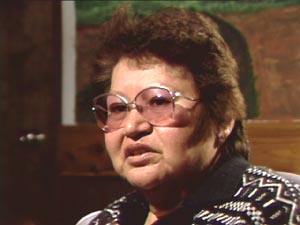Native tribes lose an
icon; services set for Amy Trice
|
|
July 24, 2011 |
 |
|
Amy Trice,
whose leadership was integral in
bringing what was a small, dying tribe
to national attention, and in so doing
restored the dignity of its people,
passed away Thursday, July 21. |
Amy Trice, a long-time leader of the Kootenai
Tribe of Idaho and chairman of the Tribe when,
in 1974, it became the last Indian tribe to
declare war, albeit peaceful, on the United
States, died Thursday morning in Spokane
following complications during surgery.
According to information posted on Facebook by
her grandson, Gary Aitken Jr., her body is
scheduled to arrive at the Kootenai Mission at 5
p.m. today, when her wake will begin. Rosary
will be at 7 p.m. Monday, July 25, and services
will be held at 11 a.m. Tuesday, July 26, at St.
Anne's Catholic Church, Bonners Ferry, with
burial to follow at the Mission.
Amy grew up in Bonners Ferry seeing first hand
the repression of the Kootenai people, living in
tipis near town in the 1930s, unable to get
assistance from the Bureau of Indian Affairs
because the tribe was too small ... and one of
few that had never signed a treaty with the
United States government.
Her incredible story was told in a 2009
documentary by Sonya Rosario.
"It's a story that needed to be told," Rosario
said of the film, which has been shown at the
Sundance Film Festival and is now a feature on
Idaho Public Television's "Idaho, A Portrait."
"If it wasn't, we could have lost this
incredible voice and part of the history of
Idaho."
Living in substandard housing and seeing little
hope for their future, Trice and the 67 members
of the tribe declared "war" on the United States
in 1974, but it wasn't a war reminiscent of the
tales of the old west. Tribal members set up
toll booths on local roads, threatening to close
them if their demands were not met.
Their bold stand drew intense media attention,
with then-Idaho Governor Cecil Andrus sending in
a contingent of the Idaho State Police and
then-U.S. Senator James McClure and Congressman
Steve Symms flying to Bonners Ferry to negotiate
with Tribal leaders.
While not all their demands were met, the tribe,
having lost all its aboriginal lands and having
been split into several separate factions by the
placement of state and national borders, 1974
marked a turning point for the Kootenai Tribe.
It gained a 12-acre mission along the Kootenai
River, decent housing, a clinic.
While those things were important, Trice
succinctly summed up what the Tribe truly
gained.
"We got our dignity back," she said. "That was
what the war accomplished."
In the years since, the Kootenai Tribe has faced
other challenges.
In 1986, the Tribe opened the Kootenai River Inn
in Bonners Ferry, improving the Tribe's economic
condition. After years of bitter fights with
U.S. government regulators, the Tribe fought for
and won, in 1996, the right to bring gaming to
the Inn, making it possible for them to focus
their attention to things of importance;
education, health care, the environment.
Each year since, the Tribe has been a staunch
supporter of local public schools and brought
educational opportunites to the Mission's
children never before available. Many of those
children have gone on to earn college degrees,
and have returned to serve as the Tribe's next
generation of leaders.
Frustrated by indecisive action by the federal
government to do what was needed to protect the
Kootenai River White Sturgeon, not having
successfully spawned since the Libby Dam was
built in the late 1970s, the Tribe, opposed
almost every step of the way by government
regulation, established a hatchery to keep the
sturgeon alive until measures could be taken to
once again provide the conditions the ancient
fish needs to survive on its own.
Now a model and cornerstone of the sturgeon
recovery effort, the tribe has been recognized
as a vital local voice in matters of national
interest. This summer, the tribe embarks on what
may well prove the salvation of many fish
species native to the Kootenai River, the
Kootenai River Restoration Project, which will
reconfigure the course of the river to
accommodate the artificial flows created by the
Libby Dam, brining it back to conditions more
natural when only nature prevailed.
Thanks largely to her efforts, the Kootenai
Tribe of Idaho is now taking its rightful place
alongside other governmental agencies, working
as an equal partner with the county, local
cities, the state and the federal government
agencies that hold sway here to accomplish hard
tasks that are of importance to all of us.
In the years since the war, Trice became a
mentor not only to future leaders of her tribe,
but to Indian tribes across the United States
and Canada, travelling extensively to speak of
the importance of dignity and heritage and of
the many things that can be accomplished, even
by small groups long overlooked as insignificant
by the prevailing powers that be, when they
bravely refuse to lie down "and just go away."
"People here in Oklahoma and across the nation
are saddened by the recent passing of Amy Trice
and would appreciate more of her bio
information," wrote Sherman Chaddlesone, a Kiowa
artist of Anadarko, Oklahoma. "Why hasn't News
Bonners Ferry provided that?"
While we haven't received any information from
the family of Amy Trice and no obituary has yet
been released, the only answer can be, "we have
been remiss."
A full obituary will be published when it
becomes available, and we would be grateful to
receive and publish the reminicences of all
those who knew and were inspired by her. |
|
Questions or comments? Click
here to
email! |
|
|

